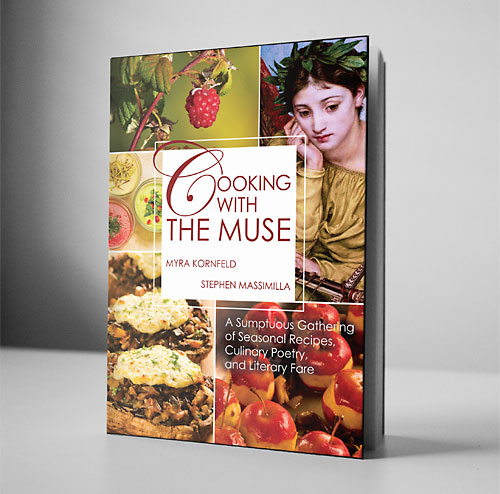For a link to the review, CLICK HERE:
Cooking with the Muse
A Sumptuous Gathering of Seasonal Recipes, Culinary Poetry, and Literary Fare

Reviewed by Josh Cook
This banquet of words and recipes invites all chefs to slow down and enjoy the seasons.
In the introduction to Cooking With the Muse, Myra Kornfield and Stephen Massimilla describe the project as a “cookbook for all book lovers and lovers of food.” The veritable brick contains over 150 recipes inspired by global cuisine and bold flavors. It is also part literary anthology, including commentaries, micro essays, poems, and historical notes, with “emphasis … on the richness and abundance of foods and words with which we can nourish our bodies, our senses, our hearts, and our minds.”
Myra Kornfield is a nutritionist and chef; Stephen Massimilla is a poet and critic. They’re also husband and wife, and their personalized notes following each recipe give their book a feeling of intimacy. They dedicate thirty pages to a history of food-inspired poetry, from Homer to Shakespeare to Wendell Berry. There’s also a section called “Returning to Real Food,” where they dash off a locavore plea—fresher is better; try to buy sustainable meat; everything in moderation.
The recipes, though unafraid of salt, butter, red meats, and sweeteners, contain a refreshing balance of sweet-salty and surprising subtle twists on classics. For instance, brussels sprouts cooked in ghee and dusted with caraway and fennel replaces the tired bacon-Parmesan preparation.
The range will teach the novice cook how to properly chop onions, make bone broth, and preserve pickles, but there are also plenty of classic French techniques for the experienced home cook, like how to make a duck-leg confit and properly cook skate wings.
The book is organized by season, beginning with autumn. It is further organized by individual ingredient—pears, apples, corn, etc. Some recipes are complex; others are simple. The blackberry parfait calls for a layering of blackberries, sugar, crème fraîche, and cream. Get good ingredients, a French chef might say, and try not to screw them up. The heart of this big, beautiful book beats with that philosophy, but also this: respect the food, and please, slow down, and don’t forget to read some poetry along the way.
Disclosure: This article is not an endorsement, but a review. The author provided free copies of his/her book to have his/her book reviewed by a professional reviewer. No fee was paid by the author for this review. Foreword Reviews only recommends books that we love. Foreword Magazine, Inc. is disclosing this in accordance with the Federal Trade Commission’s 16 CFR, Part 255.
